Related Research Articles
Patriarchate is an ecclesiological term in Christianity, designating the office and jurisdiction of an ecclesiastical patriarch. According to Christian tradition three patriarchates were established by the apostles as apostolic sees in the 1st century: Rome, Antioch, and Alexandria. Constantinople was added in the 4th century and Jerusalem in the 5th century. Eventually, together, these five were recognised as the pentarchy by the Council of Ephesus in 431.
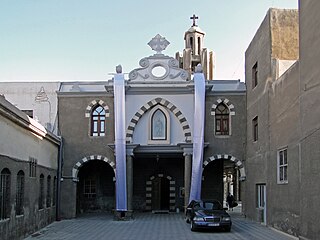
The Syriac Catholic Church is an Eastern Catholic Christian originating in the Levant that uses the West Syriac Rite liturgy and has many practices and rites in common with the Syriac Orthodox Church. Being one of the twenty-three Eastern Catholic Churches, the Syriac Catholic Church is a self-governed sui iuris particular church church while it is in full communion with the Holy See and entirety of the Catholic Church.
Patriarch of Antioch is a traditional title held by the bishop of Antioch. As the traditional "overseer" of the first gentile Christian community, the position has been of prime importance in Pauline Christianity from its earliest period. This diocese is one of the few for which the names of its bishops from the apostolic beginnings have been preserved. Today five churches use the title of patriarch of Antioch: one Oriental Orthodox ; three Eastern Catholic ; and one Eastern Orthodox.

The Melkite Greek Catholic Church or Melkite Byzantine Catholic Church, is an Eastern Catholic church in full communion with the Holy See as part of the worldwide Catholic Church. Its chief pastor is Patriarch Youssef Absi, headquartered at the Cathedral of Our Lady of the Dormition, Damascus, Syria. The Melkites, Byzantine Rite Catholics, trace their history to the early Christians of Antioch, formerly part of Syria and now in Turkey, of the 1st century AD, where Christianity was introduced by Saint Peter.

The Catholic Church in Egypt is considerably small as compared to the rest of the Christian population in Egypt, which is a significant minority among Muslims. The Catholic population in Egypt is said to have begun during the British control of Egypt. However, many returned to Europe after the 1952 Revolution in Egypt, which also caused the overthrow and exile of King Farouk of Egypt. Catholics in Egypt belong to seven distinct ritual Particular Churches sui iuris, the largest being the Coptic Catholic Church, led by its Patriarch of Alexandria.
The title of patriarchs of the East is used by primates of several Christian denominations within Eastern Christianity. Historically, the title originated as ecclesiastical designation for primates of the Church of the East. It was, and still is, officially used by different branches of the historical Church of the East.

The Melkite Catholic Patriarchate of Antioch is the only actual residential Patriarchate of the Melkite Greek Catholic Church. It was formed in 1724 when a portion of the Orthodox Church of Antioch went into communion with Rome, becoming an Eastern Catholic Church, while the rest of the ancient Patriarchate continues in full communion with the rest of the Eastern Orthodox Church.
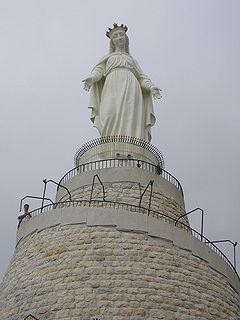
Christianity in Lebanon has a long and continuous history. Biblical Scriptures purport that Peter and Paul evangelized the Phoenicians, whom they affiliated to the ancient patriarchate of Antioch. The spread of Christianity in Lebanon was very slow where paganism persisted especially in the mountaintop strongholds of Mount Lebanon. A 2015 study estimates some 2,500 Lebanese Christians have Muslim ancestry, whereas the majority of Lebanese Christians are direct descendants of the original early Christians.
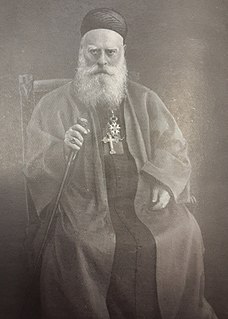
Elias Peter Hoayek was the 72nd Patriarch of Antioch for the Maronites, the largest Christian Catholic community in the Levant, from 1898 to 1931 when he died.
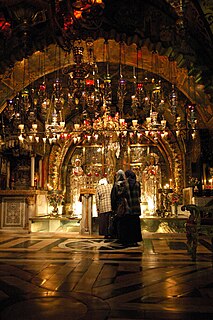
Christianity, which originated in the Middle East in the 1st century AD, is a significant minority religion within the region. Christianity in the Middle East is characterized by the diversity of its beliefs and traditions, compared to Christianity in other parts of the Old World. Christians now make up approximately 5% of the total Middle Eastern population, down from 20% in the early 20th century. Cyprus is the only Christian majority country in the Middle East, with Christians forming between 76% and 78% of the country's total population, and most of them adhere to Eastern Orthodox Christianity. Lebanon has the second highest proportion of Christians in the Middle East, ranging between 39% and 41% and predominantly consisting of Maronite Christians. Egypt has the next largest proportion of Christians, at around 10% of its total population. Copts, numbering around 10 million, constitute the single largest Christian community in the Middle East.

Demetrius I Qadi was Patriarch of Antioch and All the East, and Alexandria and Jerusalem of the Melkite Greek Catholic Church from 1919 until 1925.

The Ain Traz Seminary of the Melkite Greek Catholic Church, located southeast of Beirut, Lebanon, has served various roles during its 200-year history.

The Maronite Catholic Patriarchate of Antioch is the seat of the Patriarch of the Maronite Church. It is currently governed by the Patriarch Cardinal Bechara Boutros al-Rahi, OMM.

The Catholic Church in the Middle East is under the spiritual leadership of the Pope in Rome. The Catholic Church is said to have traditionally originated in the Middle East in the 1st century AD, and was one of the major religions of the region from the 4th-century Byzantine reforms until the centuries following the Arab Islamic conquests of the 7th century AD. Ever since, its proportion has decreased until today's diaspora tendency, mainly due to persecution by Islamic majority societies. In most Islamic countries, the Catholic Church is severely restricted or outlawed. Significant exceptions include Israel and Lebanon.
Catholic dioceses in the Holy Land and Cyprus is a multi-rite, international episcopate in Israel and Cyprus.
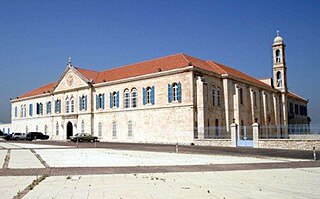
The Maronite Church is an Eastern Catholic sui iuris particular church in full communion with the pope and the worldwide Catholic Church, with self-governance under the Code of Canons of the Eastern Churches. The current head of the Maronite Church is Patriarch Bechara Boutros al-Rahi, who was elected in March 2011 following the resignation of Patriarch Nasrallah Boutros Sfeir. The current seat of the Maronite Patriarchate is in Bkerke, northeast of Beirut, Lebanon. Officially known as the Antiochene Syriac Maronite Church, it is part of Syriac Christianity by liturgy and heritage.
References
- ↑ Council Of Catholic Patriarchs Of The Orient (CPCO) from Encyclopedia.com, retrieved 30 March 2021
- ↑ Mideast Catholic leaders call for peace and stability from Sunday Examiner , 6 December 2020, retrieved 31 March 2021
- ↑ Conseil des Patriarches Catholiques d’Orient (C.P.C.O.) from GCatholic.org, retrieved 30 March 2021